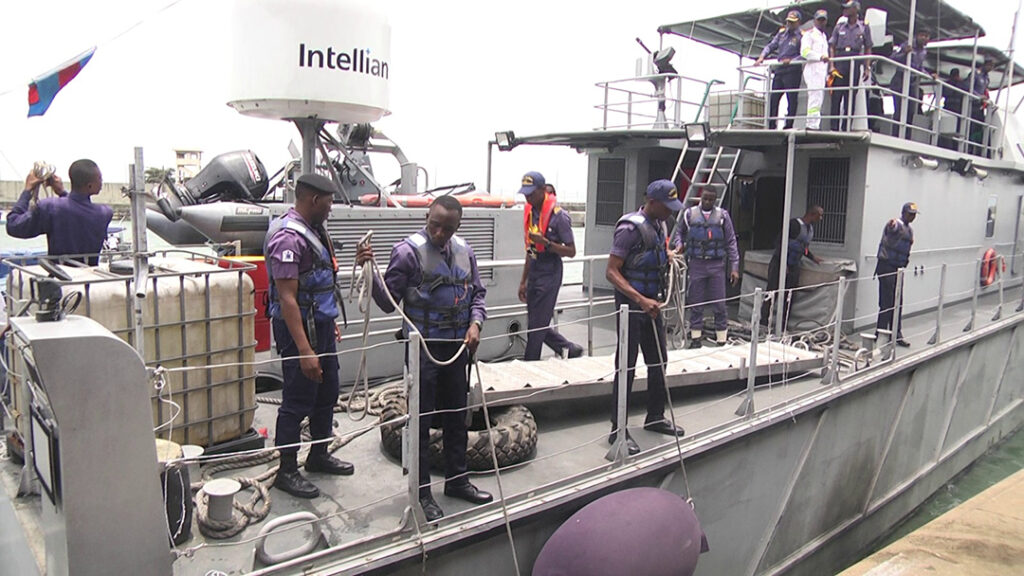ADF STAFF
Shipowners operating in the Gulf of Guinea received a piracy alert in late June after a Swiss bulk carrier vessel was boarded and some of its crew injured during a pirate attack off Conakry, Guinea.
Four criminals with weapons boarded the ship and stole money from a safe before fleeing, according to TradeWinds, a shipping news source.
It was one of the latest piracy incidents recorded in West Africa after years of declining attacks, including 81 in 2020, 34 in 2021 and just three last year.
To address piracy, illegal fishing and other sea crimes, Benin, Nigeria and Togo in mid-September conducted a five-day maritime security operation known as “Operation Safe Domain II.”
“These security challenges undermine the economic development of the zone while endangering the livelihood of local coastal communities and seafarers in general,” said Director of Multinational Maritime Coordination Centre Zone E, Nigerian Navy Commodore Aniedi Ibok in a report by Nigeria’s newsdiaryonline.com. “Therefore, the operation will help defeat the adversary in whatever form they appear.”
Launched from Benin’s Cotonou Port Naval Base, the operation featured patrol boats from Benin and Togo, and a Nigerian aircraft. The nations are members of the Maritime Zone E, part of the Yaoundé Architecture for Maritime Security and Safety.
Nigerian Chief of Naval Staff Vice Adm. Emmanuel Ogalla said the operation bolstered cohesion of the navies and diplomatic ties of the countries.
“In addition, the operation will make the environment safe, secure, and hitch-free for economic activities to thrive within the maritime zones of Zone E,” Ogalla told Nigerian newspaper Peoples Gazette. “This will boost economic activities, improve the economy, and provide employment, among other benefits, to member countries in the zone.”
Beninese Chief of Defence Staff Brig. Gen. Fructueux Gbaguidi was grateful for the cooperation of the four countries.
“This has made it possible for us to realize the objectives of securing our waters and checkmating the activities of pirates and sea crime in our maritime domain,” Gbaguidi said in a newsdiaryonline.com report.
West Africa also loses as much as $9.4 billion annually due to illegal fishing, mostly by China, which has the world’s largest distant-water fishing fleet and the world’s worst illegal fishing record, according to the IUU Fishing Index. The index monitors illegal, unreported and unregulated fishing.
Chinese bottom trawlers catch an estimated 2.35 million tons of fish a year in the region, accounting for 50% of China’s total distant water catch and worth about $5 billion, the Environmental Justice Foundation reported.
Commodore Richard Shammah, director of the Regional Maritime Security Coordination Centre, West Africa, said countries are becoming more aware of the economic value their waters hold, and that for a country’s blue economy to prosper, its maritime domain must be secure.
“This operation is necessary so that we can have a sea line of communication and trade and no one country can do it alone, hence the collaborative effort,” Shammah said during the operation. “It is my prayers that the aim and objectives of this collaboration shall be achieved because it will also tend to develop capacity with our navies.”
The Pew Charitable Trusts highlighted the importance of collaboration and cooperation to eliminate the scourge in a 2023 report titled, “To End Illegal Fishing, Countries Must Work Together.”
The report argues that regional coordination can help countries counter specific illegal activities, such as transshipment, the practice of transferring fish from a fishing vessel to a refrigerated cargo ship. Also known as “saiko,” the practice allows vessels to avoid catch limits.
“Increasing regional cooperation and coordination is a hard but necessary step to help stamp out IUU fishing, improve ocean health, and bring benefits — including international credibility — to all States involved,” wrote the report’s authors, Katherine Hanly and Tahiana Fajardo Vargas.

